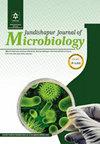Evaluation of False Negative Among SARS-COV-2 Patients with Negative Real-time PCR Result Using Nested-RT PCR
IF 0.5
4区 医学
Q4 MICROBIOLOGY
引用次数: 0
Abstract
Background: Fast and precise detection of SARS-CoV-2 RNA in clinical samples and subsequent quarantine are two critical factors in preventing virus transmission and distribution through the community. The false-negative result is a major problem in the SARS-CoV-2 detection because of the kind of sample (swab sample), sampling error, and sensitivity of PCR test, which can be reduced by a much more sensitive test such as nested PCR. Objectives: This study aimed to evaluate the false-negative rate among samples that were negative by a real-time PCR test using RT-nested PCR. Methods: One hundred eighty-four negative samples were included in the study, and nucleic acid was extracted using a commercial kit based on a silica filter column and then subjected to RT-nested PCR using three sets of primers targeting Orf1ab, N, and RdRp regions. Results: Among 184 negative swab samples for SARS-CoV-2, 27 (14.6%) cases were positive for the Orf1ab gene using RT-nested PCR. The samples were tested using N and RdRp primer sets. Also, seven (3.8%) cases were positive for the N gene, and four (2.1%) cases were positive for the RdRp gene. Conclusions: The results indicated that RT-nested PCR could be more sensitive than real-time PCR and reduce the false-negative rate.巢式rt - PCR对实时PCR阴性患者假阴性的评价
背景:快速准确地检测临床样本中的严重急性呼吸系统综合征冠状病毒2型核糖核酸和随后的隔离是防止病毒在社区传播和分布的两个关键因素。假阴性结果是严重急性呼吸系统综合征冠状病毒2型检测中的一个主要问题,因为样本的种类(拭子样本)、采样误差和PCR检测的敏感性,而嵌套PCR等更敏感的检测可以降低这种敏感性。目的:本研究旨在通过使用RT-nested PCR的实时PCR检测来评估阴性样本的假阴性率。方法:将184份阴性样本纳入研究,使用基于二氧化硅过滤柱的商业试剂盒提取核酸,然后使用靶向Orf1ab、N和RdRp区域的三组引物进行RT嵌套PCR。结果:在184份严重急性呼吸系统综合征冠状病毒2型阴性拭子样本中,27例(14.6%)病例使用RT-nested PCR检测出Orf1ab基因阳性。使用N和RdRp引物组对样品进行测试。此外,7例(3.8%)N基因阳性,4例(2.1%)RdRp基因阳性。结论:RT-nested-PCR比实时PCR更灵敏,降低了假阴性率。
本文章由计算机程序翻译,如有差异,请以英文原文为准。
求助全文
约1分钟内获得全文
求助全文
来源期刊

Jundishapur Journal of Microbiology
MICROBIOLOGY-
CiteScore
1.30
自引率
0.00%
发文量
56
审稿时长
6-12 weeks
期刊介绍:
Jundishapur Journal of Microbiology, (JJM) is the official scientific Monthly publication of Ahvaz Jundishapur University of Medical Sciences. JJM is dedicated to the publication of manuscripts on topics concerning all aspects of microbiology. The topics include medical, veterinary and environmental microbiology, molecular investigations and infectious diseases. Aspects of immunology and epidemiology of infectious diseases are also considered.
 求助内容:
求助内容: 应助结果提醒方式:
应助结果提醒方式:


